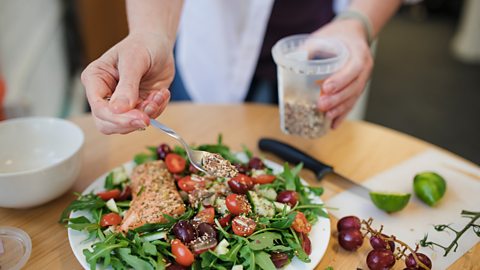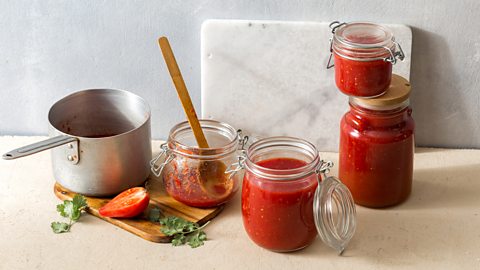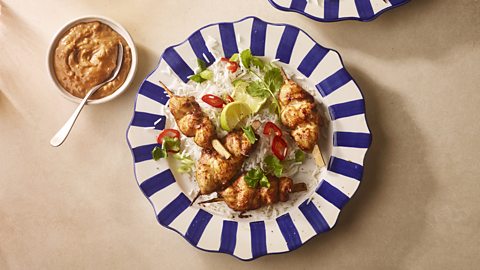Marcus Wareing’s underrated ingredients and how to use them
The celebrity chef has access to the world’s finest ingredients, but sometimes it’s the everyday items that make a dish shine…
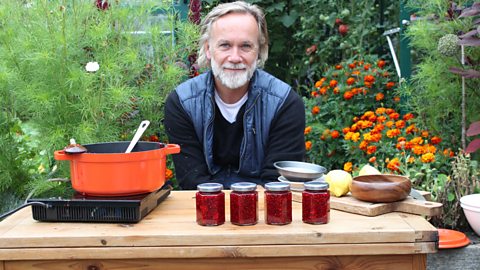
With a Michelin star to his name, Marcus Wareing is known for his elaborate dishes, but did you know he’s just as likely to use a stock cube as the next person?
With the second series of Marcus Wareing’s Tales from a Kitchen Garden beginning on BBC Two on 28 August, the TV chef spoke to BBC Food about some of the ingredients he uses in the show and why he loves cooking with them.
Stock cubes
“The old fashion powdered stock cubes just bring something extra to dishes which are lacking flavour. They act as flavour enhancers.
“You can add three or four into a big batch of gravy to add a strong flavour. They’re good to use as rubs for meat as well – especially if you’re barbecuing. They’re also great for finishing things like a bolognese sauce or stew.”
Rosemary and fennel pollen
“On the series I use lots of herbs, but if I could only have two, I’d go for rosemary and fennel pollen.
“Rosemary is a very powerful hard herb. It grows in abundance and is so diverse for cooking with. It’s good for fish, loads of meats and veggies too. In addition, it’s ideal for marinades and for chopping up and adding to sauces.
“It’s just as good to use as a base ingredient as it is when you’re topping a beautiful piece of lamb that you’ve just cooked.
“Fennel pollen is something that grows in abundance in my garden and it’s incredibly powerful and pungent – you can use it in everything from ice cream to fish and it’s even great for putting into salt.
“They are little flowers which break off and give a very concentrated flavour, way more than fennel does. It’s easy to pick and even if you don’t cook with it, you can put it into jars around your house because they look great and give a fantastic scent.”
Red wine vinegar and sherry vinegar
“All too often, we just stick to white wine vinegar, but you get a much deeper flavour with these ones – they’re just such great store-cupboard staples.
“Red wine vinegar is a great back-up flavour for something like romesco sauce, while sherry vinegar works well in a reduction for a hollandaise or when making mayonnaise.
“They’re also both great for preserving ingredients too. For example, if you have a glut of herbs in the garden, you could add loads of them to a bottle along with either of these two vinegars – this will just send the flavours. They’re also great for creating a classic vinaigrette.”
Dijon mustard
“Dijon is mild, has a great heat background and is just so user-friendly. Because of that I tend to use Dijon more than other mustards. It doesn’t have to jump to the forefront of what you’re cooking. It helps to build a flavour rather than overpower it.
“Flavour-wise, it’s not overly complex so you can use it lots of different dishes. It’s great in sauces for fish and meat – especially pork. If I’m having a steak and I’m not going to make any sauce to go with it, I just put a bit of Dijon mustard on the side of the plate and it’s perfect.”
Sausage with fried potatoes and onion gravy
Marcus includes Dijon mustard in his hearty pork sausage and potato fry-up
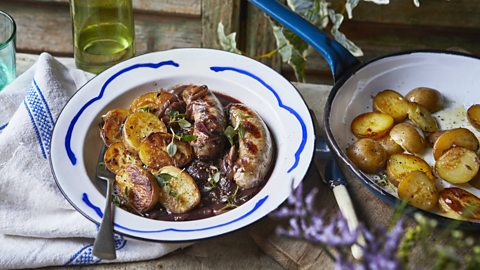
Limes
“When you think of limes you might think of things like cheesecake and cordials. They really are great for both, but they are also brilliant for cooking and using in savoury dishes.
“When you cook citrus fruits, they change and you can eat the skins – the heating process breaks down both the flesh and skin and it just brings a completely different flavour to dressings and sauces.
“I love to cook them whole on the barbecue. I just put them on the coals and then when ready, blitz them down – skin included – and use them for dishes like black barbecue sauce.”
Horseradish
“I never liked horseradish growing up because it was always horseradish relish – the type you get in a jar for a Sunday roast. It was too strong.
“Horseradish root is a lot milder. When we bought this house, it was already growing in the garden – it seems to be one of those things that you plant once and then it just keeps going and going. So, I started using it!
“Unlike the jars of horseradish – which make you feel like your brain is going to blow out – you can use it to add a little flavour to dishes. I always use it raw and in simple ways. I grate it and then add to either a little cream or crème fraiche. It’s also nice if you add some (grated, again) to a little vinegar and olive oil – it becomes a good dressing. I like it a lot.”
Garlic
“This sounds obvious but, on the series, I use lots of types of garlic.
“Black garlic is quite intense in its flavour; it’s almost got a molasses taste to it. If you’re trying to track it down, you’ll find most black garlic will be in jars – fresh is quite rare but you might find it in delis.
“Elephant garlic is my favourite type of garlic because you can just slice it and then use it. Despite it being big and having a lot of flavour, it’s milder than regular garlic, with quite a gentle flavour.
“Smoked garlic is great if you want an alternative flavour in the background of your dish. You can buy the bulbs smoked or do it yourself – which I do. I grow garlic then hang it on a rope in my shed and when I’m smoking something else, I just take a bunch and add it in at the same time.”
Wild mushrooms and baked eggs
Wareing is a big fan of garlic – in this dish it features alongside mushrooms
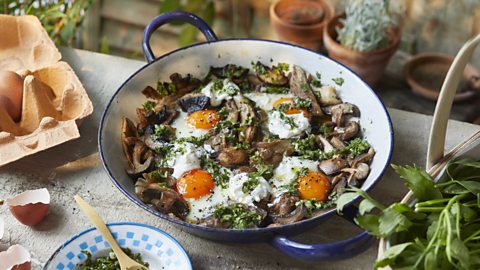
Samphire
“This is quite an unusual veg but it’s great. Samphire goes really well with fish and seafood. It’s salty which I like but it’s also got a high vitamin C content and has such a good flavour.
“If you want to use it in a slightly different way, I also think it’s really cool inside salads. Just throw it in raw.”
Capers and gherkins
“These are my wife’s favourite. They’re both perfect mixed in with the horseradish dressing that I mentioned earlier.
“When you’ve got a burger going on the barbecue and you can top it with a pickled gherkin it works a treat.
“If you’re looking for alternative ways to use capers, they really suit sauces and you can also crush them and put them into a marinade as a flavour enhancer.
Green garden soup
One of the ingredients in this refreshing soup is gherkins
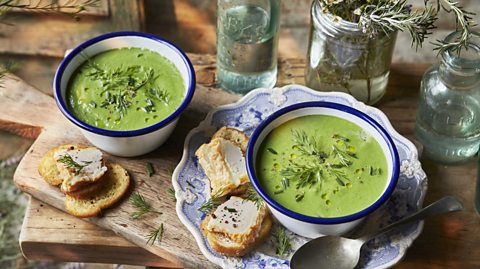
“Something people don’t realise is that, often, the quantity of capers a chef will use is quite extraordinary. You might think that just a few in a marinade will make a big difference, but you’ve got to pack tonnes and tonnes of these things into dishes to get the best flavour out of them, because they’re often quite delicate.”
Watch series two of Marcus Wareing’s Tales from a Kitchen Garden on BBC Two and iPlayer, from 28 August 2023.
Originally published August 2023
